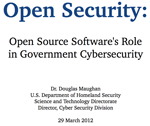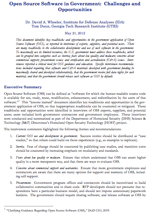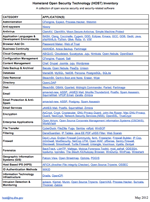Homeland Open Security Technology (HOST)
The mission of the Homeland Open Security Technology (HOST) program is to investigate open security methods, models and technologies and identify viable and sustainable approaches that support national cyber security objectives. The foundational technology for the purposes of HOST is based on open source software.
Open-source software (OSS) is computer software that is available in source code form: the source code and certain other rights normally reserved for copyright holders are provided under a software license that permits users to study, change, improve and at times also distribute the software. – Wikipedia
HOST program activities include three key areas of focus:
DISCOVERY: The HOST program will investigate new and existing open security projects and techniques that support and protect government cyber assets. This will be achieved in part through the development and sharing of comprehensive, public accessible inventory of open source projects, tools and applications as well as best practices and lessons learned.
COLLABORATION: Coordinating development activities and encouraging working relationships between public and private-sector research and development communities is core to increasing the sustainable use of Open Security Technology. Cross-industry events, designed to serve as platforms for collaboration, are already underway.
INVESTMENT: DHS is committed to providing seed investments in advanced research and development activities that support national cyber security objectives and have the potential to create sustainable project communities. This is achieved in part by enabling broad adoption and participation by public and private-sectors. (See “Suricata” below as an exemplary project).
Host Program Activities

|
Suricata Open Source Intrusion Detection System (IDS) |

|
Federal Information Processing Standard (FIPS 140-2) validated OpenSSL Cryptographic Module Library |
 |
Open Security: Open Source Software’s Role in Government Cybersecurity |
 |
Open Source Software in Government: Challenges and Opportunities |
 |
Open Security Catalog |
Host Program News and Update
Cyber Security HOST Project Receives National Honor
Science and Technology Cyber Security Division’s Homeland Open Security Technology (HOST) project was recently awarded the Open Source for America (OSFA) 2011 Government Deployment of Open Source Award. HOST won the award in the category of “Open Source Deployment in Government”. More information on the annual OSFA awards can be found on their web site (http://opensourceforamerica.org/2011/11/awards/)
Mailing List – If you would like to stay current on this program, please contact the program at host@hq.dhs.gov and request to be added to our mailing list.
Upcoming Talks & Events
GFIRST Conference – August 19-24, 2012)
GFIRST Conference is a great place for public and private sector leaders serving in non-technical roles to become familiar with the fundamentals of cybersecurity and incident response. GFIRST is also an excellent resource for practitioners in incident response and information security from the public and private sectors to include: Academia with Cyber Security Specialties, Chief Information Security Officers, Computer Forensic Personnel, Critical Information Infrastructure Owners & Operators, Emergency Managers, Information Technology Directors, Network Administrators, Security Engineers, Software Developers & Managers and many more.
Previous Talks & Events
GovLoop Webinar (June 7, 2012 at 2pm Eastern) – Open Source Software in Government: Challenges and Opportunitie
GovLoop, the Homeland Open Source Technology (HOST) program, and RedHat hosted the GovLoop Webinar on June 7, 2012 at 2PM ET to discuss a recent HOST report. Main topics of the GovLoop Webinar included: Current open source software roadblocks; the state of the collaborative development of software; open source software security; opportunities for open source software in government; and available solutions.
International Conference on Cyber Security – Fordham University, January 2012
REALIZING THE VALUE OF OPEN SECURITY: LEVERAGING THE TECHNICAL, ECONOMIC AND OPERATIONAL BENEFITS OF OPEN SOURCE SOFTWARE TECHNOLOGIES IN SUPPORT OF NATIONAL CYBER SECURITY OBJECTIVES – Protection of our citizenry, critical infrastructure and national security interests from cyber threats requires continual development of advanced technologies, methods and techniques to keep us ahead of the threat curve. As the scope of adversarial threats expand, governmental budget constraints require that we think more with our head and less with our wallet. The Department of Homeland Security’s Cyber Security Division and Science and Technology Directorate have invested in several programs, such as the Homeland Open Security Technology (HOST) program, designed to identify and leverage the technical, economic and operational benefits of the open source software development model in support of national cyber security objectives. This talk will explain the DHS strategic vision as well as provide examples of how and where open source software can serve as a valuable part of a comprehensive cyber security strategy.
Contact US
To learn more about HOST or to get involved, please contact the program at host@hq.dhs.gov

